Unit 11 How was your school trip?(单元复习课件)-七年级英语下册同步备课系列(人教版)
文档属性
| 名称 | Unit 11 How was your school trip?(单元复习课件)-七年级英语下册同步备课系列(人教版) |
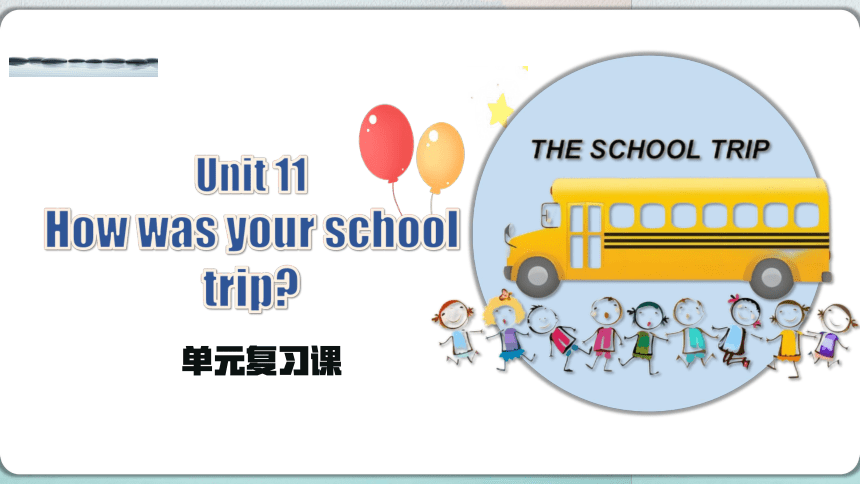
|
|
| 格式 | pptx | ||
| 文件大小 | 40.7MB | ||
| 资源类型 | 试卷 | ||
| 版本资源 | 人教新目标(Go for it)版 | ||
| 科目 | 英语 | ||
| 更新时间 | 2024-05-07 00:00:00 | ||
图片预览


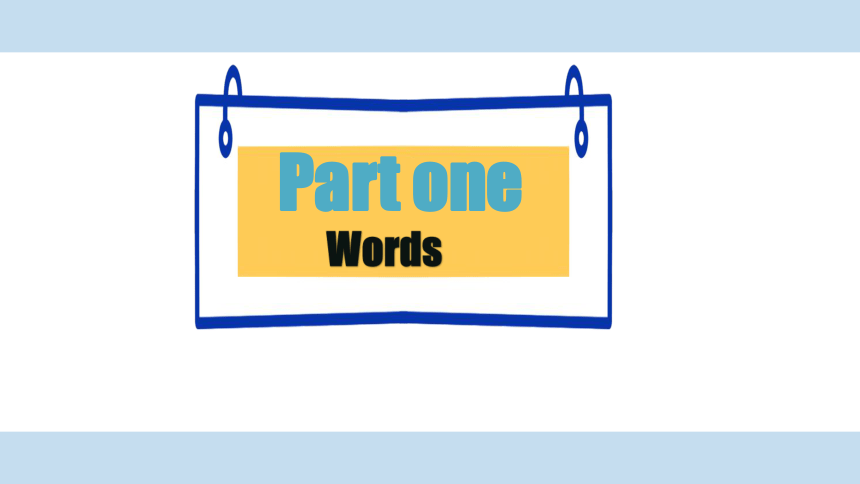
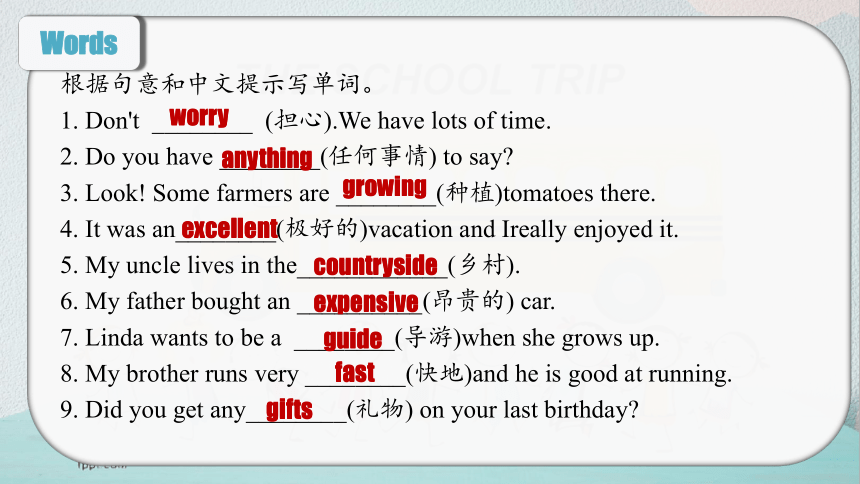
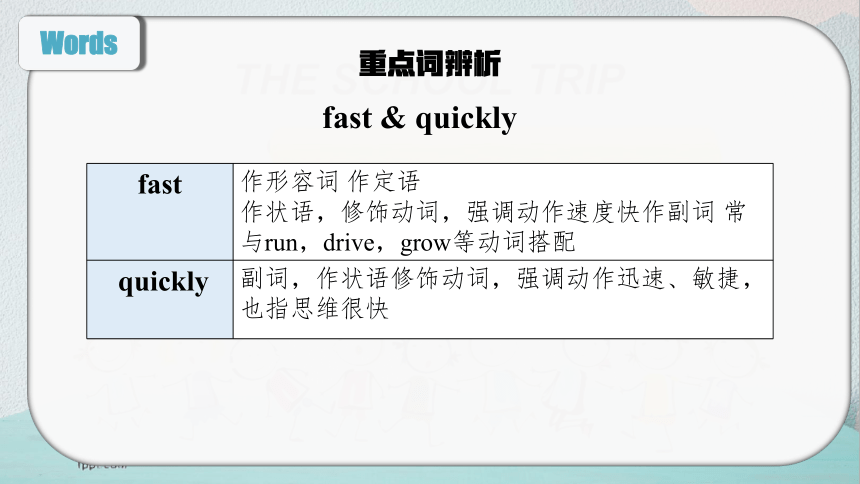
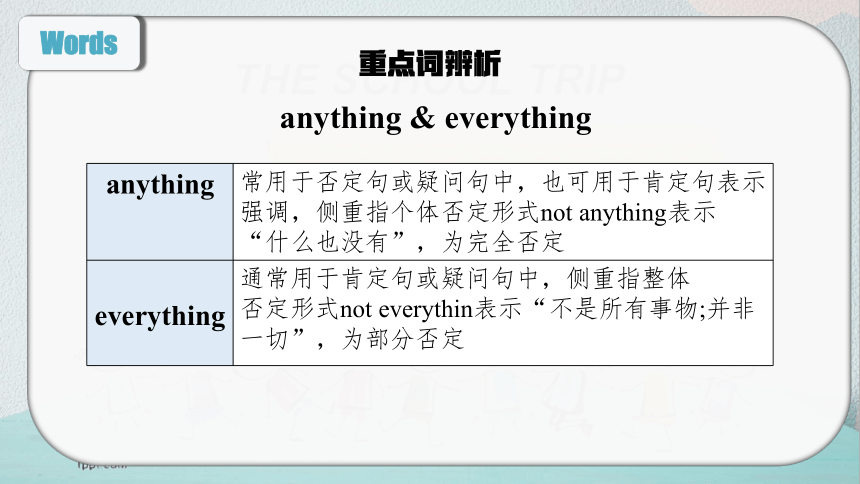
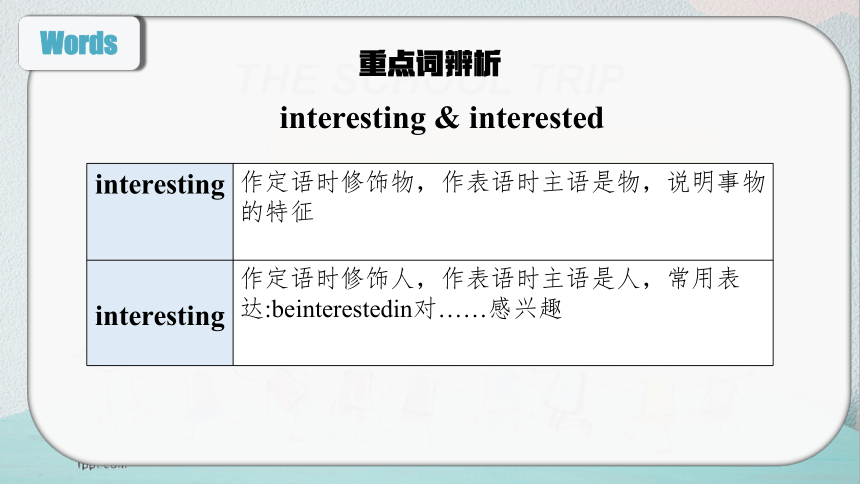
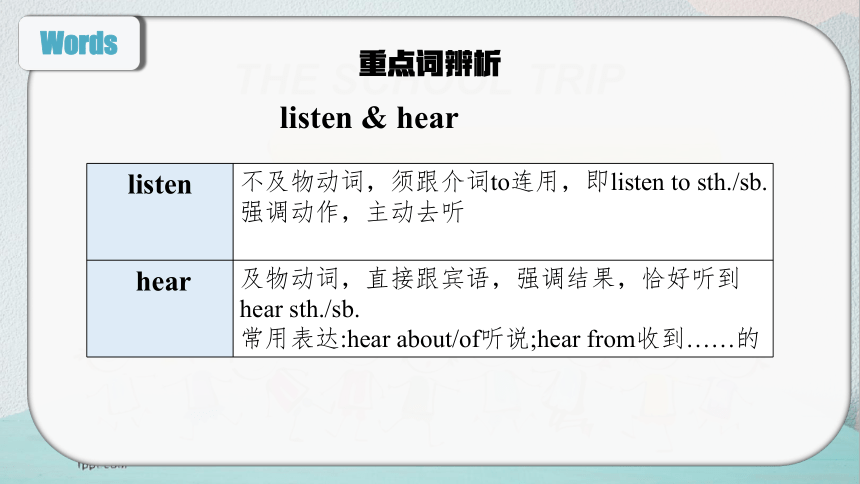
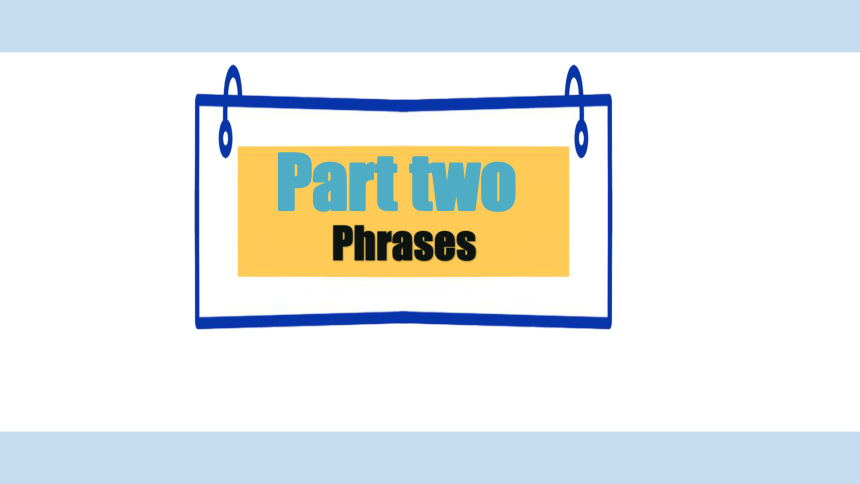
文档简介
01
02
03
Words
Phrases
Grammar
Exercises
05
06
Homework
04
Writing
根据句意和中文提示写单词。
1. Don't ________ (担心).We have lots of time.
2. Do you have ________(任何事情) to say?
3. Look! Some farmers are ________(种植)tomatoes there.
4. It was an________(极好的)vacation and Ireally enjoyed it.
5. My uncle lives in the____________(乡村).
6. My father bought an __________(昂贵的) car.
7. Linda wants to be a ________(导游)when she grows up.
8. My brother runs very ________(快地)and he is good at running.
9. Did you get any________(礼物) on your last birthday?
worry
anything
growing
excellent
countryside
expensive
guide
fast
gifts
worry
anything
growing
excellent
countryside
expensive
guide
fast
gifts
重点词辨析
fast & quickly
{073A0DAA-6AF3-43AB-8588-CEC1D06C72B9}fast
作形容词 作定语
作状语,修饰动词,强调动作速度快作副词 常与run,drive,grow等动词搭配
quickly
副词,作状语修饰动词,强调动作迅速、敏捷,也指思维很快
anything & everything
重点词辨析
{073A0DAA-6AF3-43AB-8588-CEC1D06C72B9}anything
常用于否定句或疑问句中,也可用于肯定句表示强调,侧重指个体否定形式not anything表示“什么也没有”,为完全否定
everything
通常用于肯定句或疑问句中,侧重指整体
否定形式not everythin表示“不是所有事物;并非一切”,为部分否定
interesting & interested
重点词辨析
{073A0DAA-6AF3-43AB-8588-CEC1D06C72B9}interesting
作定语时修饰物,作表语时主语是物,说明事物的特征
interesting
作定语时修饰人,作表语时主语是人,常用表达:beinterestedin对……感兴趣
listen & hear
重点词辨析
{073A0DAA-6AF3-43AB-8588-CEC1D06C72B9}listen
不及物动词,须跟介词to连用,即listen to sth./sb.强调动作,主动去听
hear
及物动词,直接跟宾语,强调结果,恰好听到hear sth./sb.
常用表达:hear about/of听说;hear from收到……的
school trip
go for a walk
milk a cow
ride a horse
feed chickens
talk with the farmer
take some photos
grow apples
show sb. around sp.
be interested in
1. 学校旅行 2. 去散步
3. 挤牛奶 4. 骑马
5. 喂鸡 6. 与农民交谈
7. 照相 8. 种苹果
9.带某人逛某地 10.对……感兴趣
learn a lot
pick some strawberries
last week
visit my grandparents
go fishing
go on a school trip
climb the mountains
visit a museum
come out
learn about
11. 学到许多 12. 摘草莓
13. 上周 14. 拜访我祖父母
15. 去钓鱼 16. 去旅行
17. 去爬山 18. 参观博物馆
19.出来 20.了解
一 般 过 去 时
句型结构
动词过去式
变化规则
用法&
时间状语
一 般 过 去 时
用法 & 时间状语
一般过去时表示过去某个时间发生的动作或存在的状态,常和表示过去的时间状语连用。如 yesterday,a moment ago(刚才),yesterday morning, last night/week,the day before yesterday(前天),just now(刚才),in+过去的时间(in 1980)等。
一 般 过 去 时
动词过去式变化规则
一般的动词
直接加-ed
play-playedwant-wanted
以字母e结尾的动词
直接加-d
hope-hoped live-lived
以辅音字母加y结尾的动词
变y为i,再加-ed先双写
study--studied worry -worried
重读闭音节结尾的动词,末尾只有一个辅音字母
这个辅音字母,再加-ed
stop-stopped shop-shopped
<规则变化>
不规则动词的过去式变化各异,没有统一的规则,但也并非一点规律没有,下面介绍一部分动词过去式的记忆规律。
①动词过去式与动词原形一样。如:let->let,put-put,cut->cut。
②遇见i改为a。如:swim-swam,sing-sang,begin-began。
③过去式以ought和aught结尾的单词,如:bring brought,buy-bought,think thought, teach -taught.
④中间去e末尾加t,如:feel-felt,keep kept,sleep-slept, sweep-swept, meet-met.
⑤把i変为o,如:ride -rode,drive -drove, write -wrote。
⑥ow/aw变为ew,如:know-knew,grow-grew,throw-threw。
⑦以d结尾的词,把d变成l,如:build-built,lend-lent,send-sent,spend-spent。
⑧be动词的过去式有两种形式,主语是第一、三人称单数形式用 was,其他人称用 were。
<不规则变化>
一 般 过 去 时
句型结构
(1) 含be动词的一般过去时的句式
①肯定句主语+was/were十其他.Our school trip was terrible last week,我们上周的学校旅行很糟糕
②否定句:主语+was not(wasn't)/were not(weren't)十其他.I wasn't at home yesterday.昨天我不在家。
③一般疑问句为“Was/Were十主语十其他?”。
肯定回答常用“Yes,主语+was/were. 否定回答常用“No,主语+wasn't/weren't.”
-Were you at home yesterday?昨天你在家吗?-No,I wasn't.不,我不在家
④特殊疑问句:疑问词十was/were十主语十其他?How was your school trip?
你的学校旅行怎么样?
一 般 过 去 时
句型结构
①肯定句:主语十动词过去式十其他.They had a good time yesterday.他们昨天玩得很开心。
②否定句:主语+did not/didn't十动词原形十其他.They didn't watch TV last nigh1.昨天晚上他们没有看电视。
③一般疑问句为“Did+主语十动词原形十其他?”。肯定回答常用“Yes,主语+did,” 否定回答常用“No,主语+didn't.”
④特殊疑问句:疑问词+did+主语十动词原形十其他?What time did you finish your homework?你是什么时候做完家庭作业的?
(2) 含实义动词的一般过去时的句式
写
作
要
求
Today I went on aschool trip. 今 天我进行了一次学校郊游。
I think today’s school trip was terrible. 我认为今天的学校郊游很糟糕。
We took the train to the museum. 我们乘火车去博物馆
We visited the science museum and it was very interesting.我初中英语大讲堂们参观了科学博物馆,那真的很有趣。
I went to the gift shop and bought some lovely gifts formy parents.我去了礼品店给我父母买了一些可爱的礼物。
They weren’t expensive.它们不贵。
Al in all,it was an exciting day.总的来说,这是激动人心的一天
话题分析
本单元以学校旅行为话题,主要描述旅行期间所发生的事情及感受。此类文章以记叙文为主要说明事情的时间、地点、人物、经过和结果,同时要注意一般过去时的正确使用。
素材积累
实
战
演
练
写一篇关于妮上一次学校旅行的日记,叙述学校旅行的活动,并对自己的活动做出简单评价,注意:语言通顺、意思连贯、书写规范。日记内容应该包括下面六个问题。
Who did you go with? Where did you visit?
When did you go there? How did you go there
What did you do ? How was the weather?
My School Trip
Time
Beginning(开头)
Body(正文)
Ending(结尾)
place
transportation
feeling
activities1,2,3.
It was a great/ boring trip.
June 23rd
I went on a trip last weekend. It was very exciting.
I went to a park with my friends. The weather was sunny and cool. We went there by bike. We saw some farms along the way. I climbed the mountains and took some great photos. At noon, I had lunch in the park.The food was expensive in the park. The people were friendly.
I really enjoyed in the park.
1.-- _____up on time next time,Tom.
--OK,I will.
A.Get B.Getting C.gets D.To get
2._____say dirty words to others.It’s not polite.
A.Can’t B.Doesn’t C.Aren’t D.Don’t
3._____come in!
A.Please B.Sorry C.Excuse me D.Thank you
4._____up or we will be late.
A.Hurry B.Hurries C.To hurry D.Hurrying
5.Tom,____get close to that dag.
A.Can’t B.Doesn’t C.Aren’t D.Don’t
A
D
A
A
D
1. He has two cups of _______(牛奶)every day.
2. Is there a________ wrong with your bike?
3. Mary is never late for school. She is an e_______ girl.
4. Tom got up late. ________(luck), the bus was also late.
5. The pen is too e________. I don’t have enough money.
6. The film is very ________(excite). We all like it.
milk
nything
xcellent
Luckily
exciting
xpensive
02
03
Words
Phrases
Grammar
Exercises
05
06
Homework
04
Writing
根据句意和中文提示写单词。
1. Don't ________ (担心).We have lots of time.
2. Do you have ________(任何事情) to say?
3. Look! Some farmers are ________(种植)tomatoes there.
4. It was an________(极好的)vacation and Ireally enjoyed it.
5. My uncle lives in the____________(乡村).
6. My father bought an __________(昂贵的) car.
7. Linda wants to be a ________(导游)when she grows up.
8. My brother runs very ________(快地)and he is good at running.
9. Did you get any________(礼物) on your last birthday?
worry
anything
growing
excellent
countryside
expensive
guide
fast
gifts
worry
anything
growing
excellent
countryside
expensive
guide
fast
gifts
重点词辨析
fast & quickly
{073A0DAA-6AF3-43AB-8588-CEC1D06C72B9}fast
作形容词 作定语
作状语,修饰动词,强调动作速度快作副词 常与run,drive,grow等动词搭配
quickly
副词,作状语修饰动词,强调动作迅速、敏捷,也指思维很快
anything & everything
重点词辨析
{073A0DAA-6AF3-43AB-8588-CEC1D06C72B9}anything
常用于否定句或疑问句中,也可用于肯定句表示强调,侧重指个体否定形式not anything表示“什么也没有”,为完全否定
everything
通常用于肯定句或疑问句中,侧重指整体
否定形式not everythin表示“不是所有事物;并非一切”,为部分否定
interesting & interested
重点词辨析
{073A0DAA-6AF3-43AB-8588-CEC1D06C72B9}interesting
作定语时修饰物,作表语时主语是物,说明事物的特征
interesting
作定语时修饰人,作表语时主语是人,常用表达:beinterestedin对……感兴趣
listen & hear
重点词辨析
{073A0DAA-6AF3-43AB-8588-CEC1D06C72B9}listen
不及物动词,须跟介词to连用,即listen to sth./sb.强调动作,主动去听
hear
及物动词,直接跟宾语,强调结果,恰好听到hear sth./sb.
常用表达:hear about/of听说;hear from收到……的
school trip
go for a walk
milk a cow
ride a horse
feed chickens
talk with the farmer
take some photos
grow apples
show sb. around sp.
be interested in
1. 学校旅行 2. 去散步
3. 挤牛奶 4. 骑马
5. 喂鸡 6. 与农民交谈
7. 照相 8. 种苹果
9.带某人逛某地 10.对……感兴趣
learn a lot
pick some strawberries
last week
visit my grandparents
go fishing
go on a school trip
climb the mountains
visit a museum
come out
learn about
11. 学到许多 12. 摘草莓
13. 上周 14. 拜访我祖父母
15. 去钓鱼 16. 去旅行
17. 去爬山 18. 参观博物馆
19.出来 20.了解
一 般 过 去 时
句型结构
动词过去式
变化规则
用法&
时间状语
一 般 过 去 时
用法 & 时间状语
一般过去时表示过去某个时间发生的动作或存在的状态,常和表示过去的时间状语连用。如 yesterday,a moment ago(刚才),yesterday morning, last night/week,the day before yesterday(前天),just now(刚才),in+过去的时间(in 1980)等。
一 般 过 去 时
动词过去式变化规则
一般的动词
直接加-ed
play-playedwant-wanted
以字母e结尾的动词
直接加-d
hope-hoped live-lived
以辅音字母加y结尾的动词
变y为i,再加-ed先双写
study--studied worry -worried
重读闭音节结尾的动词,末尾只有一个辅音字母
这个辅音字母,再加-ed
stop-stopped shop-shopped
<规则变化>
不规则动词的过去式变化各异,没有统一的规则,但也并非一点规律没有,下面介绍一部分动词过去式的记忆规律。
①动词过去式与动词原形一样。如:let->let,put-put,cut->cut。
②遇见i改为a。如:swim-swam,sing-sang,begin-began。
③过去式以ought和aught结尾的单词,如:bring brought,buy-bought,think thought, teach -taught.
④中间去e末尾加t,如:feel-felt,keep kept,sleep-slept, sweep-swept, meet-met.
⑤把i変为o,如:ride -rode,drive -drove, write -wrote。
⑥ow/aw变为ew,如:know-knew,grow-grew,throw-threw。
⑦以d结尾的词,把d变成l,如:build-built,lend-lent,send-sent,spend-spent。
⑧be动词的过去式有两种形式,主语是第一、三人称单数形式用 was,其他人称用 were。
<不规则变化>
一 般 过 去 时
句型结构
(1) 含be动词的一般过去时的句式
①肯定句主语+was/were十其他.Our school trip was terrible last week,我们上周的学校旅行很糟糕
②否定句:主语+was not(wasn't)/were not(weren't)十其他.I wasn't at home yesterday.昨天我不在家。
③一般疑问句为“Was/Were十主语十其他?”。
肯定回答常用“Yes,主语+was/were. 否定回答常用“No,主语+wasn't/weren't.”
-Were you at home yesterday?昨天你在家吗?-No,I wasn't.不,我不在家
④特殊疑问句:疑问词十was/were十主语十其他?How was your school trip?
你的学校旅行怎么样?
一 般 过 去 时
句型结构
①肯定句:主语十动词过去式十其他.They had a good time yesterday.他们昨天玩得很开心。
②否定句:主语+did not/didn't十动词原形十其他.They didn't watch TV last nigh1.昨天晚上他们没有看电视。
③一般疑问句为“Did+主语十动词原形十其他?”。肯定回答常用“Yes,主语+did,” 否定回答常用“No,主语+didn't.”
④特殊疑问句:疑问词+did+主语十动词原形十其他?What time did you finish your homework?你是什么时候做完家庭作业的?
(2) 含实义动词的一般过去时的句式
写
作
要
求
Today I went on aschool trip. 今 天我进行了一次学校郊游。
I think today’s school trip was terrible. 我认为今天的学校郊游很糟糕。
We took the train to the museum. 我们乘火车去博物馆
We visited the science museum and it was very interesting.我初中英语大讲堂们参观了科学博物馆,那真的很有趣。
I went to the gift shop and bought some lovely gifts formy parents.我去了礼品店给我父母买了一些可爱的礼物。
They weren’t expensive.它们不贵。
Al in all,it was an exciting day.总的来说,这是激动人心的一天
话题分析
本单元以学校旅行为话题,主要描述旅行期间所发生的事情及感受。此类文章以记叙文为主要说明事情的时间、地点、人物、经过和结果,同时要注意一般过去时的正确使用。
素材积累
实
战
演
练
写一篇关于妮上一次学校旅行的日记,叙述学校旅行的活动,并对自己的活动做出简单评价,注意:语言通顺、意思连贯、书写规范。日记内容应该包括下面六个问题。
Who did you go with? Where did you visit?
When did you go there? How did you go there
What did you do ? How was the weather?
My School Trip
Time
Beginning(开头)
Body(正文)
Ending(结尾)
place
transportation
feeling
activities1,2,3.
It was a great/ boring trip.
June 23rd
I went on a trip last weekend. It was very exciting.
I went to a park with my friends. The weather was sunny and cool. We went there by bike. We saw some farms along the way. I climbed the mountains and took some great photos. At noon, I had lunch in the park.The food was expensive in the park. The people were friendly.
I really enjoyed in the park.
1.-- _____up on time next time,Tom.
--OK,I will.
A.Get B.Getting C.gets D.To get
2._____say dirty words to others.It’s not polite.
A.Can’t B.Doesn’t C.Aren’t D.Don’t
3._____come in!
A.Please B.Sorry C.Excuse me D.Thank you
4._____up or we will be late.
A.Hurry B.Hurries C.To hurry D.Hurrying
5.Tom,____get close to that dag.
A.Can’t B.Doesn’t C.Aren’t D.Don’t
A
D
A
A
D
1. He has two cups of _______(牛奶)every day.
2. Is there a________ wrong with your bike?
3. Mary is never late for school. She is an e_______ girl.
4. Tom got up late. ________(luck), the bus was also late.
5. The pen is too e________. I don’t have enough money.
6. The film is very ________(excite). We all like it.
milk
nything
xcellent
Luckily
exciting
xpensive
同课章节目录
- Unit 1 Can you play the guitar?
- Section A
- Section B
- Unit 2 What time do you go to school?
- Section A
- Section B
- Unit 3 How do you get to school?
- Section A
- Section B
- Unit 4 Don't eat in class.
- Section A
- Section B
- Unit 5 Why do you like pandas?
- Section A
- Section B
- Unit 6 I'm watching TV.
- Section A
- Section B
- Review of Units 1-6
- Unit 7 It's raining!
- Section A
- Section B
- Unit 8 Is there a post office near here?
- Section A
- Section B
- Unit 9 What does he look like?
- Section A
- Section B
- Unit 10 I'd like some noodles.
- Section A
- Section B
- Unit 11 How was your school trip?
- Section A
- Section B
- Unit 12 What did you do last weekend?
- Section A
- Section B
